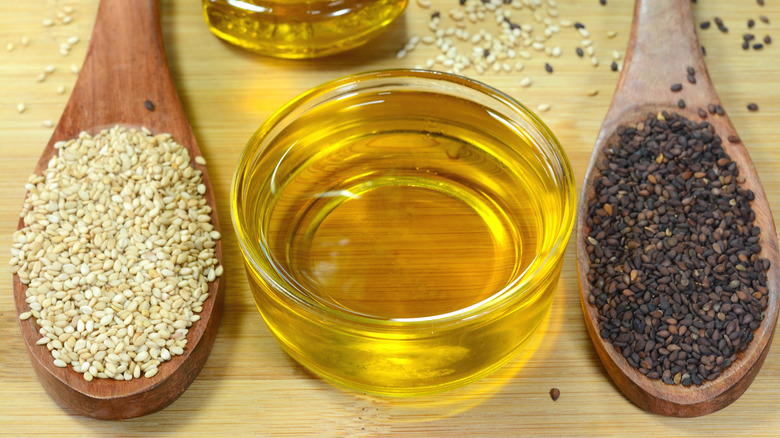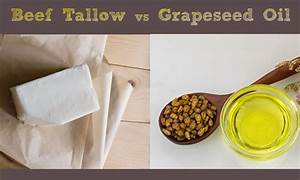Introduction
When choosing cooking fats, it’s important to understand the differences between common oils and fats. Beef tallow and seed oils are two popular options, but which one is better for your cooking? Let’s dive into their key differences.
What is Beef Tallow?

Beef tallow is rendered fat from beef, known for its high smoke point and rich, savory flavor. It’s often used for frying, roasting, and even seasoning cast iron pans. Unlike seed oils, tallow is minimally processed and has high fat-soluble vitamins.
Simply put, beef tallow is the fat rendered from, you guessed it, beef. Often referred to as ‘liquid gold’, beef tallow is known for having a lot of fat-soluble vitamins, along with fatty acids that can be good for gut health in small doses. Where beef tallow really shines is during the cooking process, especially when using high-heat methods. “Compared to seed oils like canola or soybean, beef tallow is more stable under heat, has zero trans fats, and isn’t as heavily processed,” chef Dennis Littley shared. Beef tallow’s smoking point comes in at a high 400 degrees Fahrenheit — this temperature is ideal for frying, roasting, and even seasoning cast iron pans with your beef tallow.
The important question remains: How does beef tallow affect flavor? Well, it isn’t called liquid gold for nothing. “Flavor-wise, tallow has personality,” Littley told Food Republic. “It’s not for every dish, but when you want real character in your cooking, it brings something special that neutral oils just can’t match.” Beef tallow’s natural umami quality and savory undertones make it great for bringing out that same richness in other foods, all while adding a smokiness at top temperatures. If you want to try cooking with beef tallow at home, deep frying a potato product is a good place to start — you will get a taste for how the tallow interacts with the starch to create the ultimate crispy bite. After all, there’s a delicious reason fast food chains used beef tallow to cook fries for so many years.
What Are Seed Oils?

Seed oils, such as canola and sunflower oil, are extracted from vegetable seeds and refined through chemical processes. While they have a lighter flavor, seed oils are often rich in omega-6 fatty acids and are a staple in many kitchens.
Seed oils don’t just refer to those seemingly fancy alternatives — in fact, one of the most common pantry staples also fits this classification. That’s right, vegetable oil actually comes primarily from seeds, and contains a good amount of Omega-6 fatty acids, hence why it’s so popular. This is where the debate tends to start within the culinary and nutrition worlds, because both beef tallow and seed oils contain similar fat properties, and are both said to provide both health benefits and drawbacks. According to Dennis Littley, “Seed oils often go through chemical refinement, bleaching, and deodorizing, while good-quality tallow is usually just rendered fat, nothing extra.” However, seed oils come in much larger varieties, and are a great solution for those who cut out meat from their diets.
In truth, it comes down to a matter of preference — certain seed oils will emulate the flavor of the fruit or nut they come from, while also being a lighter alternative to the richness of beef tallow. On the other hand, beef tallow can provide a depth of flavor and texture that you can’t achieve using seed oils, and it is more naturally sourced. As debate continues, it’s best to investigate which of these fatty acids best suit your dietary preferences, and how each cooking fat will impact your recipes. With each of these ingredients having many good qualities, it’s worth experimenting and exploring the difference between seed oils and beef tallow for yourself.
Key Differences Between Beef Tallow and Seed Oil
- Flavor: Beef tallow offers a rich, umami flavor, while seed oils are more neutral.
- Heat Stability: Tallow performs better at high temperatures, making it ideal for frying, with a smoke point of 400°F.
- Processing: Seed oils are often refined, deodorized, and bleached, whereas tallow is naturally rendered.
- Health Benefits: Tallow contains fat-soluble vitamins like A, D, E, and K, while seed oils are high in omega-6 fatty acids.
- Dietary Preferences: Tallow is an animal fat, while seed oils are plant-based and suitable for vegans.
Conclusion
Ultimately, the choice between beef tallow and seed oil comes down to your cooking needs and dietary preferences. Whether you’re looking for a stable fat for high-heat cooking or a lighter oil for everyday use, both options have their benefits. Experiment with both to find out which one suits your recipes best.









